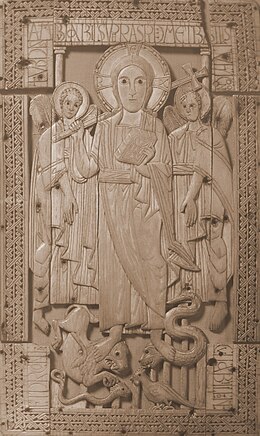| Psalm 91 | |
|---|---|
| "He that dwelleth in the secret place of the most High" | |
| Psalm of protection | |
 Late 8th century ivory plaque with Christ treading on the beasts, illustrating verse 13. From Genoelselderen (in present-day Belgium).[1] | |
| Other name |
|
| Language | Hebrew (original) |
Psalm 91 is the 91st psalm of the Book of Psalms, beginning in English in the King James Version: "He that dwelleth in the secret place of the most High shall abide under the shadow of the Almighty." In Latin, it is known as 'Qui habitat".[2] As a psalm of protection, it is commonly invoked in times of hardship. Though no author is mentioned in the Hebrew text of this psalm, Jewish tradition ascribes it to Moses, with David compiling it in his Book of Psalms. The Septuagint translation attributes it to David.
In the slightly different numbering system used in the Greek Septuagint and Latin Vulgate translations of the Bible, this psalm is Psalm 90.
The psalm forms a regular part of Jewish, Catholic, Eastern Orthodox, Lutheran, Anglican and other Protestant liturgies. The complete psalm and selected verses have often been set to music, notably by Heinrich Schütz and Felix Mendelssohn, who used verses for his motet Denn er hat seinen Engeln befohlen. The psalm has been paraphrased in hymns. The psalm was originally written in the Hebrew language. It is divided into 16 verses.
- ^ Favreau, Roberto (1991). "Le thème iconographique du lion dans les inscriptions médiévales". Comptes rendus des séances de l'Académie des Inscriptions et Belles-Lettres (in French). 135 (3): 613–36. doi:10.3406/crai.1991.15027. Retrieved 2010-03-13.
- ^ Parallel Latin/English Psalter / Psalmus 90 (91) Archived 2017-05-07 at the Wayback Machine. Medievalist.